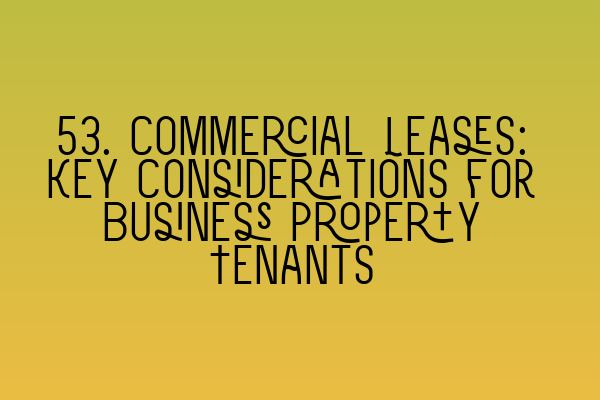53. Commercial Leases: Key Considerations for Business Property Tenants
When it comes to leasing commercial property for your business, there are several key considerations that you should keep in mind. A commercial lease is a legally binding agreement between a landlord and a tenant, and it’s crucial to understand the terms and conditions before signing on the dotted line.
1. Lease Length
One of the first things to consider is the length of the lease. Commercial leases can vary in length, ranging from as short as one year to as long as 20 years or more. The duration of the lease depends on several factors, including the nature of your business and your long-term goals.
It’s important to think strategically about the lease length and how it aligns with your business plans. If you’re just starting out or unsure about your future growth, a shorter lease term might be more suitable. On the other hand, if you have an established business and want stability and security, a longer lease term can provide peace of mind.
2. Rent and Rent Reviews
The next important consideration is the rent and rent review clauses. The rent is the amount of money you will pay to the landlord for the use of the property. It’s crucial to ensure that the rent is affordable and within your budget. Take into account any potential rent increases during the term of the lease, as well as the frequency of rent reviews.
Most commercial leases include rent review clauses, which allow the landlord to increase the rent at specific intervals. Common rent review methods include fixed increases, market rent assessments, or rent linked to the Retail Price Index (RPI). Understanding the rent review mechanism is essential to avoid any unexpected financial burdens in the future.
3. Repair and Maintenance
The repair and maintenance obligations are another critical aspect of a commercial lease. As a tenant, you may be responsible for maintaining and repairing certain parts of the property, such as the interior, fixtures, and fittings. It’s vital to review these obligations carefully and make sure they are reasonable and manageable for your business.
Consider whether the lease includes a full repairing and insuring (FRI) covenant, which means you will be responsible for all repairs and maintenance. Alternatively, the lease may include a Schedule of Condition, which documents the condition of the property at the beginning of the lease, limiting your repair responsibilities to maintaining the property in that condition.
4. Permitted Use and Alterations
Every commercial lease will specify the permitted use of the property. Ensure that the permitted use aligns with your business activities and any future plans for expansion or diversification. If you anticipate making any alterations to the property, such as changing the layout or adding signage, check whether the lease allows for such modifications or whether you need the landlord’s consent.
5. Assignment and Subletting
Assigning or subletting a commercial lease can be vital for business flexibility. If there’s a possibility you might want to transfer or sublet the property in the future, review the assignment and subletting clauses in the lease. These clauses will outline the conditions and requirements for assigning or subletting the property, including obtaining the landlord’s consent and any associated fees.
6. Break Clauses and Termination
A break clause allows you or the landlord to terminate the lease before the end of the term, providing flexibility and an opportunity to review the arrangement in the future. Pay close attention to the break clause provisions and any conditions that need to be met to exercise the break option. It’s also important to understand the termination provisions and the consequences of early termination.
These are just a few key considerations when entering into a commercial lease. It’s advisable to seek professional legal advice to ensure you fully understand the terms and conditions of the lease and how they may impact your business.
If you’re preparing for the SQE exam and want to test your knowledge on property law, you can find practice exam questions here.
Additionally, if you’re interested in SQE preparation courses, both for SQE 1 and SQE 2, you can find more information here and here.
For more important dates and updates about the SRA SQE exams, you can visit here.
